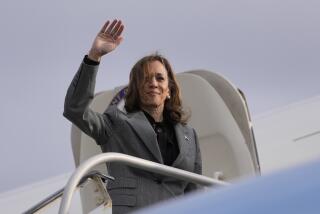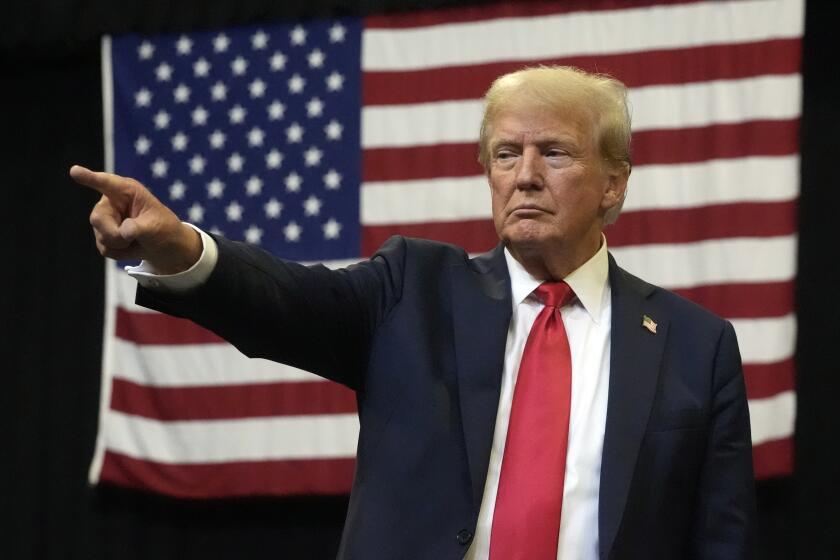Weary Voters’ Primary Decision Is ‘Do I Bother?’
For weeks, political candidates and their campaign advertisements have assaulted Stan Holden like the high-pitched whine of a dentist’s drill. Now he must decide.
He will wake up election day, Holden says, and then, depending how he feels, either cast a half-hearted ballot or skip the election altogether. He has already chosen to pass on the governor’s race.
“I don’t think any of them are worth voting for,” said Holden, a 52-year-old Democrat who lives on disability in San Francisco’s Hayes Valley.
He is far from alone.
As Californians prepare to trudge to the polls -- again, for the ninth time in six years -- the state is in a sour mood. People are tuned out, turned off and fed up with politicians, their promises and, especially, the nasty tone of their campaigns.
The electoral ennui is all the more striking given the passions that surrounded the recall election just three years ago.
Fewer than four in 10 registered voters are expected to cast ballots Tuesday, even though the Democratic gubernatorial race between Phil Angelides and Steve Westly has turned into something rare in California: a genuine cliffhanger. Voters will also consider a pair of state ballot measures, pick the nominees for several statewide offices and decide hard-fought primaries for Congress and the Legislature.
Gov. Arnold Schwarzenegger has the luxury of running without serious opposition in the GOP primary, dampening Republican interest in Tuesday’s election.
On the Democratic side, the race between state Treasurer Angelides and state Controller Westly is not only close but volatile. Surveys give each about a third of the vote, with a considerable number of Californians -- more than one in four likely voters in Friday’s Field Poll -- still struggling to make up their minds. In 60 years of surveys, the Field Poll has never turned up such a large number of undecided voters so close to a major primary election.
Yet for all the time and money spent -- $70 million and counting -- Westly and Angelides seem to have made little impression. Wotly, Witly and DiAngeles were some of the names Democrats supplied in a series of random interviews over the last few days as they struggled to identify the party’s two main gubernatorial contenders.
“I’ve heard that Angelides’ daughters like him,” said Jonathan Wee, a 40-year-old professional juggler in Hermosa Beach, referring to one of the candidates’ early feel-good advertisements. “I hope the other guy’s daughters like him too.”
Kidding aside, the warm fuzzies gave way weeks ago to a mutual onslaught of attack advertisements -- inescapable for anyone who spends any time watching commercial TV -- that have stained the images of both Democrats and left many wishing for other choices.
“I’m completely torn about all of it because there’s been so much negative trashing by both sides,” said Toni D’Ambrosia, a 21-year-old student speaking from behind the counter at a Starbucks in Oxnard.
“They’ve been so busy attacking each other that you don’t know where they stand on the issues,” echoed Luis Padilla, a 36-year-old state worker from Thousand Oaks, as he paused over lunch at a nearby Baja Fresh.
The mud heaving has managed to change some minds -- but not always the way the candidates might have hoped. Mike Arnold was impressed with Westly after seeing one of his initial ads touting his years teaching at Stanford University. Now he is leaning toward Angelides -- though at this point the 53-year-old San Francisco property manager simply wishes the race were over.
“They’re horrible,” Arnold said of the candidates’ TV ad campaigns. “Both of them.”
People griping about politicians is nothing new. To some extent, they are to blame: Even though voters say they can’t stand negative advertisements, political professionals are convinced they work, changing people’s minds about a candidate or convincing them to skip voting altogether -- which works just as well if they had planned to support the other guy.
That said, observers of various stripes agreed that voters’ discontent this spring goes beyond garden-variety grousing to reflect something deeper: a years-long accumulation of anger, frustration, disappointment and cynicism.
“People have overdosed on politics,” said Don Sipple, a Republican strategist who produced advertising for Schwarzenegger in the 2003 recall campaign and again in last year’s special election, when voters lashed out by rejecting all four of the governor’s ballot proposals. “There’s a wholesale frustration with the system.”
It has been years -- going back to the heady days of the dot-com boom -- since a majority of Californians told pollsters that the state was headed in the right direction. Many have shown their discontent by abandoning the two major political parties (if not checking out of politics altogether). The proportion of decline-to-state voters -- those who choose not to affiliate with any party -- has nearly doubled over the last dozen years, to more than 18% of registered voters, while the percentage of registered Democrats and Republicans has declined.
Although unaffiliated voters are allowed to cast ballots in the Democratic, Republican and American Independent primaries on Tuesday, most evidently won’t bother. A survey late last month by the nonpartisan Public Policy Institute of California found that 21% of independents planned to select a Democratic ballot and 8% intended to vote in the GOP contest.
“It’s all a big bear dance ... who lies the best,” said Natalie Geld, a 41-year-old independent, as she killed time in Hermosa Beach while her dog got a bath.
There are several plausible explanations for California’s foul humor: high gas prices, a slowdown in housing appreciation, immigration angst, corruption in Congress -- which sent a San Diego lawmaker to prison -- and the mire in Iraq. It may also be that California has come to expect too much of its voters.
“It seems to me at some point, there’s just too much democracy,” said Ed Constantini, a political scientist at UC Davis. “The sense I get is people saying, ‘You mean to tell me we have yet another election? I’m really exhausted.’ ”
Ken Ramonet, an accountant in San Francisco, seemed to agree. Munching an edamame salad in the city’s trendy Noe Valley neighborhood, he complained that it was impossible to walk into a Safeway without being accosted by someone holding a clipboard and collecting signatures for another ballot measure.
“I think if there are certain changes in the Constitution, or your tax rules need to be revised, that’s what the job of the state Legislature is supposed to be, not ballot measures,” said Ramonet, 42, who is sitting out Tuesday’s election because he is still angry over the Florida voting fiasco that followed the 2000 presidential campaign. “You can’t keep tacking things on without it starting to look like a cut-and-paste job that’s not going to hold up.”
Pausing near the Hermosa Pier, Bob Bragonier said much the same thing though his woolly white beard. The retired physician, 69, was on his daily five-mile walk to Manhattan Beach and back with his wife, Barbara.
“Raise the bar,” said Bragonier, speaking of the ability to place statewide ballot measures before voters. “Big money and special interests really pollute the process.”
It was less than three years ago that Californians did the extraordinary, voting to oust Democratic Gov. Gray Davis less than halfway through his second term and replace him with Schwarzenegger. It was only the second gubernatorial recall in the nation’s history.
The election, with its carnival flavor and gallery of more than 100 unconventional candidates, captivated California as few political events have in memory. A Times poll conducted a month before the vote found that nearly three in four of those surveyed were very interested in that election; by contrast, just a third of those polled in late May said they were paying close attention to Tuesday’s vote. In the end, 61% of registered voters cast ballots then, more than half again what is expected Tuesday.
For all its spectacle, many Californians saw the recall as an opportunity to upend the political system and give a slap to Sacramento, telling lawmakers and their benefactors that the old ways of doing things would no longer be tolerated. The perception that little has changed since then -- and that Schwarzenegger has not been the superhero he played on film -- may have just compounded the frustration.
“People aren’t tired of elections,” insisted David Gilliard, a Republican consultant in Sacramento and one of the architects of the recall. “They’re tired of the fact that after the election, nothing happens.”
The fact that people feel let down and seem more than a little ticked off is not surprising, he said. “That’s what happens when there’s not a pot of gold at the end of the rainbow.”
Times staff writers Michael Finnegan, Catherine Saillant and Robert Salladay contributed to this report.
More to Read
Get the L.A. Times Politics newsletter
Deeply reported insights into legislation, politics and policy from Sacramento, Washington and beyond. In your inbox three times per week.
You may occasionally receive promotional content from the Los Angeles Times.











